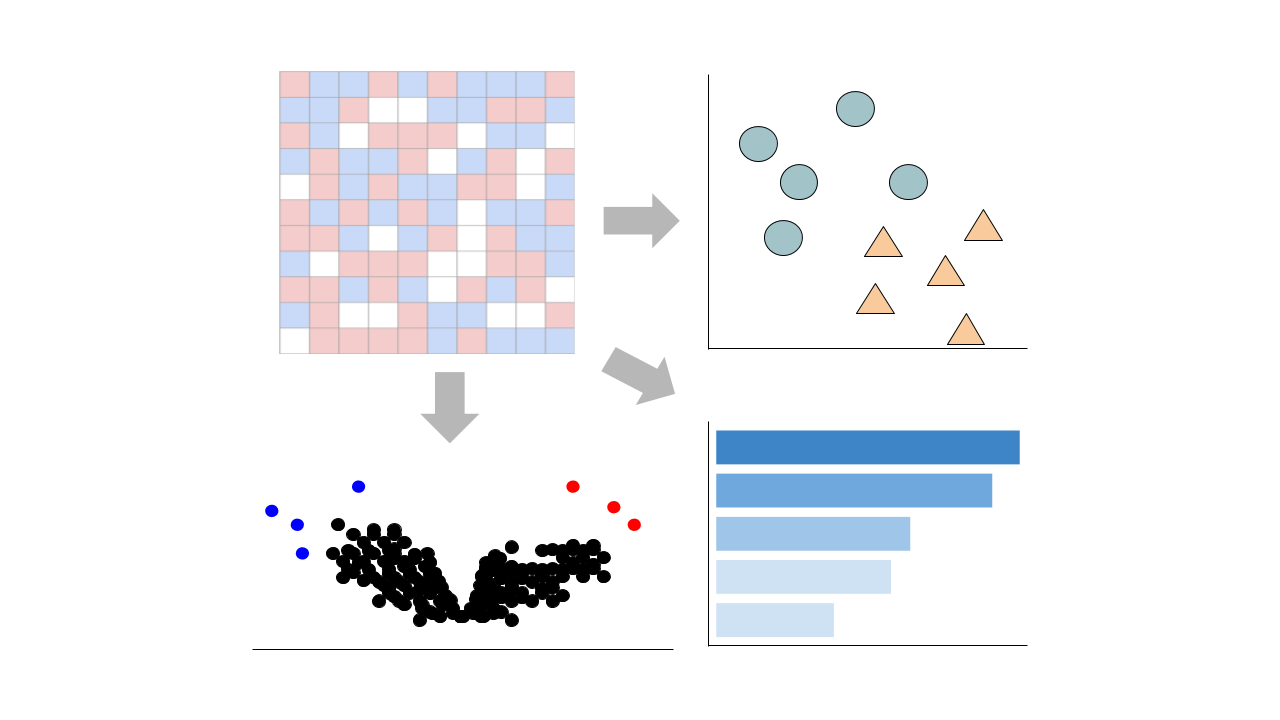 Gene counts are sourced from ARCHS4, which provides uniform alignment of GEO samples.
You can learn more about ARCHS4 and its pipeline here.
Gene counts are sourced from ARCHS4, which provides uniform alignment of GEO samples.
You can learn more about ARCHS4 and its pipeline here.
Select conditions below to toggle them from the plot:
| GROUP | CONDITION | SAMPLES |
|---|---|---|
| FoxO Triple Heterozygous |
GSM2082796 GSM2082797 GSM2082798
|
|
|
GSM2082804 GSM2082805
|
||
| FoxO Triple KO |
GSM2082806 GSM2082807 GSM2082808 GSM2082809 GSM2082810
|
|
|
GSM2082799 GSM2082800 GSM2082801 GSM2082802 GSM2082803
|
Submission Date: Mar 07, 2016
Summary: Insulin-producing beta cells become dedifferentiated during diabetes progression. An impaired ability to select substrates for oxidative phosphorylation, or metabolic inflexibility, sets the stage for progression from beta cell dysfunction to beta cell dedifferentiation. In this study, we sought to isolate and functionally characterize failing beta cells, as a preliminary step to identify pathways to reverse dedifferentiation. Using various experimental models of diabetes, we found a striking enrichment in the expression of aldehyde dehydrogenase 1 isoform A3 (ALDH+) as beta cells become dedifferentiated. Flow-sorted ALDH+ islet cells demonstrate impaired glucose-induced insulin secretion, are depleted of Foxo1 and MafA, and include a Neurogenin3-positive subset. RNA sequencing analysis demonstrates that ALDH+ cells are characterized by: (i) impaired oxidative phosphorylation and mitochondrial complex I, IV, and V; (ii) activated RICTOR; and (iii) progenitor cell markers. We propose that impaired mitochondrial function marks the progression from metabolic inflexibility to dedifferentiation in the natural history of beta cell failure.
GEO Accession ID: GSE78966
PMID: 27572106
Submission Date: Mar 07, 2016
Summary: Insulin-producing beta cells become dedifferentiated during diabetes progression. An impaired ability to select substrates for oxidative phosphorylation, or metabolic inflexibility, sets the stage for progression from beta cell dysfunction to beta cell dedifferentiation. In this study, we sought to isolate and functionally characterize failing beta cells, as a preliminary step to identify pathways to reverse dedifferentiation. Using various experimental models of diabetes, we found a striking enrichment in the expression of aldehyde dehydrogenase 1 isoform A3 (ALDH+) as beta cells become dedifferentiated. Flow-sorted ALDH+ islet cells demonstrate impaired glucose-induced insulin secretion, are depleted of Foxo1 and MafA, and include a Neurogenin3-positive subset. RNA sequencing analysis demonstrates that ALDH+ cells are characterized by: (i) impaired oxidative phosphorylation and mitochondrial complex I, IV, and V; (ii) activated RICTOR; and (iii) progenitor cell markers. We propose that impaired mitochondrial function marks the progression from metabolic inflexibility to dedifferentiation in the natural history of beta cell failure.
GEO Accession ID: GSE78966
PMID: 27572106
Visualize Samples
 Visualizations are precomputed using the Python package scanpy on the top 5000 most variable genes.
Visualizations are precomputed using the Python package scanpy on the top 5000 most variable genes.
Precomputed Differential Gene Expression
 Differential expression signatures are automatically computed using the limma R package.
More options for differential expression are available to compute below.
Differential expression signatures are automatically computed using the limma R package.
More options for differential expression are available to compute below.
Signatures:
Select conditions:
Control Condition
Perturbation Condition
Only conditions with at least 1 replicate are available to select
 Differential expression signatures can be computed using DESeq2 or characteristic direction.
Differential expression signatures can be computed using DESeq2 or characteristic direction.
This pipeline enables you to analyze and visualize your bulk RNA sequencing datasets with an array of downstream analysis and visualization tools. The pipeline includes: PCA analysis, Clustergrammer interactive heatmap, library size analysis, differential gene expression analysis, enrichment analysis, and L1000 small molecule search.

 Chatbot
Chatbot Single Gene Queries
Single Gene Queries
 Gene Set Queries
Gene Set Queries
 Bulk Studies
Bulk Studies
 Single Cell Studies
Single Cell Studies
 Hypotheses
Hypotheses
 Resources
Resources
 Contribute
Contribute
 Downloads
Downloads About
About
 Help
Help